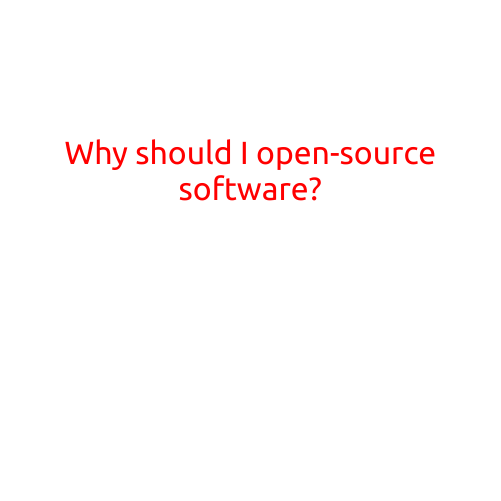
Why Should I Open-Source Software?
In today’s digital age, software development has become an integral part of our daily lives. From mobile apps to operating systems, software is everywhere, and its importance cannot be overstated. As a developer, you may be wondering whether open-sourcing your software is a good idea. In this article, we will explore the benefits of open-sourcing your software and why you should consider doing so.
What is Open-Source Software?
Before we dive into the benefits of open-sourcing your software, it is essential to understand what open-source software is. Open-source software is a type of software that is freely accessible, modifiable, and distributable. Anyone can view, modify, and distribute open-source software without any restrictions. Open-source software is typically developed through collaboration among developers, with the source code available for public review and modification.
Benefits of Open-Sourcing Your Software
- Community Engagement: Open-sourcing your software allows you to tap into a vast community of developers who can contribute to your project. This community can help you identify bugs, suggest improvements, and even develop new features. With a diverse group of developers working on your software, you can rest assured that it will continue to evolve and improve over time.
- Improved Security: Open-source software is inherently more secure than proprietary software. With multiple developers reviewing and testing your code, any security vulnerabilities can be identified and addressed quickly, reducing the risk of cyber attacks.
- Cost Savings: Development costs can be significant, especially for complex software projects. By open-sourcing your software, you can reduce development costs by leveraging the collective efforts of the open-source community.
- Flexibility and Customization: Open-source software provides unparalleled flexibility and customization options. Users can modify the code to suit their specific needs, which can lead to innovative uses and applications.
- Increased Visibility: Open-sourcing your software can increase your visibility and credibility as a developer. By making your code available for public review, you can demonstrate your commitment to transparency and collaboration.
- Reduced Risk of Dependency: By open-sourcing your software, you can reduce the risk of dependency on a single developer or company. With multiple developers working on your software, you can ensure that it continues to evolve even if key team members leave or become unavailable.
- Governance and Transparency: Open-source software provides a transparent and accountable governance structure. The open-source community reviews and approves changes to the code, ensuring that development is carried out in a fair and transparent manner.
Challenges of Open-Sourcing Your Software
While open-sourcing your software can provide numerous benefits, it also comes with some challenges. Some of the common challenges include:
- Loss of Control: Open-sourcing your software can result in a loss of control over the development process. With multiple developers contributing to your project, it can be difficult to maintain a consistent vision and direction.
- Licensing and Intellectual Property Issues: Open-sourcing your software may require you to license your intellectual property, which can be a complex and time-consuming process.
- Competitive Disadvantage: Open-sourcing your software can give competitors access to your technology and intellectual property, potentially putting you at a disadvantage.
Conclusion
Open-sourcing your software can be a valuable decision, providing numerous benefits and opportunities for growth and improvement. While there may be challenges associated with open-sourcing your software, the benefits far outweigh the risks. By embracing the open-source model, you can create a community-driven, secure, and flexible software solution that can adapt to the ever-changing needs of your users. So, if you’re considering open-sourcing your software, we recommend taking the leap and exploring the possibilities that open-source development has to offer.





